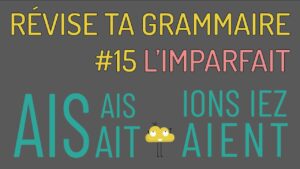The Passé Composé in French
The Passé Composé and the Imparfait have walked into a bar...
- Bonjour, step right up, step right up! I've made the most amazing crème brûl--
- Jeez, all you can think about is food! Darn it!
- Wow. What's with the attitude, Monsieur Grumpy?
- Nothing. Sorry. Pardon. Our lesson about the imparfait was helpful by the way, thanks. I aced my first French test! It's just that...
- What? Did the chat eat your langue?
- I don't know, the way you explained things made it sound like... like the imparfait was the most basic, easiest of the French past tenses... and that it would make learning the passé composé super easy. But now that I need to use it, I'm not even sure I understood anything at all the last time we talked! And I need to use it if I want to learn French! The French use it all the freaking time!
- Well--
- And the passé composé involves two verbs at the same time! It's in its name: it's a compound tense!
- Not real--
- And one of those verbs is called a helping verb! And it's in the present tense! While it's a past tense! I'm going crazy!
- How many coffees have you had before coming here?
- I don't know. Like three. Is that too much?
- Not if you're trying to have a stroke. I'll treat you to some tisane. Knowing about the imparfait is a great first step, and the passé composé is not hard to understand at all, especially when you're an English speaker. All you need is the right perspective. 'member?
- Yeah, I 'member.
FAQ: What does passé composé mean?
Passé composé means "compound past" in French. It involves a helping verb (generally to be or to have) and a full verb that describes the action.
Breaking Down Le Passé Composé
- Breaking down? Breaking down?! This requires some serious bulldozing, man! What's up with the two verbs?! And one of them's in the present tense?! Isn't the passé composé supposed to be one of the many past trees in the French forest of tenses?!
- Pastries? I love pastries!
- Past. Trees. When we talked about the imparfait, you said yourself tenses are like trees...
- Never mind what I said. Focus on what I have said right before you interrupted me. The French passé composé is very easy to understand, especially if you're an English speaker. Check out the verb parler (to speak) for instance. Doesn't it look absolutely... perfect?
| Personal pronoun | Auxiliary verb avoir (to have) in the present | Past participle of main verb |
|---|---|---|
| j' | ai | parlé |
| tu | as | parlé |
| il, elle, on | a | parlé |
| nous | avons | parlé |
| vous | avez | parlé |
| ils, elles | ont | parlé |
- Well, I guess it looks okay...
- I meant present perfect. J'ai parlé is "I have spoken", tu as parlé is "you have spoken", Il a parlé is "he has spoken"... English also has compound tenses! You take the verb "to have", put it in the present, and stick the past participle form of your verb right next to it, and voilà!
- Past participle?
- Oui, le participe passé ! The French past participle is the same as the English one: a form of the verb that doesn't really conjugate, and that partners with auxiliary verbs (or "helping verbs"), to express a perfect perspective on the action.
- Okay why didn't you bulldoze that in the first place?
FAQ: What is the formula for the passé composé?
The passé composé is similar to the present perfect. It involves a helping verb in the present tense and a full verb in the past participle form. Most of the time, the helping verb is avoir "to have".
English vs. French Pastries
- Har har.
- C'mon, it was funny! So, when we discussed the Imparfait, we talked about "perspective". We also saw that French grammar partly overlaps English when it comes to past tenses.
- Yes. And I remember all of that perfectly. But let's say I had forgotten...
- In English, you've got the simple past, the past progressive, and the present perfect. In French, I've got the passé composé... and the imparfait. You win: 3 tenses against 2! An "overlap" zone was bound to happen!
| English "past" tenses | French "past" tenses |
|---|---|
| I have spoken French (present perfect) | J'ai parlé français (passé composé) |
I spoke French (simple past) | J'ai parlé français (passé composé) OR Je parlais français (imparfait) |
| I was speaking French (past progressive) | Je parlais français (imparfait) |
- Okay so the passé composé is... a tense that conjugates in the present... but refers to past actions?
- More precisely, completed actions.
- So is it, or is it not a past tense?
- It's like you and your ex: it's complicated. Would you say the present perfect is a past tense? The answer is probably "yes and no". It's the same with the passé composé.
- Right... And did you just say you guys have 2 pastr... Past... Trees. in your forest of tenses? Isn't there more, like the passé simple?
- Popopop! It really isn't the right time to open Pandoro's box...
- Pandora's. Pandoro is a kind of Italian brioche I believe.
- Right, sorry, Pandora's box. Forget the passé simple until further notice. It's a tense that you don't use in spoken French anymore. You only find it in books, especially novels and short stories.
FAQ: What is the passé composé and how do you use it?
The passé composé is a French tense used to talk about specific actions that are completed. It corresponds to the English present perfect, and covers most uses of the English simple past.
Using the Passé Composé
- Boring title.
- Boy, it's hard to make you happy! Anyway, long story short, there's no French equivalent to I spoke in English. French requires you to take a "completeness" perspective on all actions. The passé composé is the tense you use in spoken French to tell about completed events. It can be a succession of short, specific events, or just actions that were not interrupted before you could fully perform them. Anything else requires the imparfait, the tense of incomplete actions, or just long, ongoing actions:
| Yesterday I did some shopping and I worked about three hours. | Hier j'ai fait du shopping and j'ai travaillé environ 3 heures. |
| They have told you many times not to do that! | Ils t'ont dit plusieurs fois de ne pas faire ça! |
| He was walking when his phone rang. | Il marchait (imparfait) quand son téléphone a sonné. |
- Got it. Well, thank you! That was fairly easy! See you lat--
- Popopop! Don't forget your participles!
FAQ: What is the difference between the imparfait and the passé composé?
Both are past tenses. The passé composé is about completed actions, the imparfait is about ongoing or habitual actions.
Get Your Participles Right!
- "Passé composé talks", episode 457...
- I'm just being thorough with the bulldozing. You're welcome to walk out the door...
- Are you daring me to make a French exit?
- I double dare you.
- Non. It's raining outside.
- Stay then. This discussion will be useful for all the other French compound tenses you'll learn. Okay... a super important thing to do is pay attention to the ending of your past participle.
- It's é!
- Oui. But not always. There are three verb groups in French. Two are perfectly regular, while one is a kind of a "trash group", a disorganized bunch of irregular (and unfortunately frequent) French verbs. Verb groups affect past participle endings, even if technically past participles don't conjugate like proper verb forms. Here's a good summary with examples:
| Verb group | Participle ending |
|---|---|
| 1st group: all -er verbs except aller (to go) parler, marcher, manger... | -é parlé, marché, mangé... |
| 2nd group: most -ir verbs finir, choisir, agir... | -i fini, choisi, agi... |
| 3rd group: all other verbs prendre, vouloir, atteindre... | Sort-yourself-out ending pris, voulu, atteint... |
- Sort yourself out?! Are you serious?!
- Well, we could spend hours examining rules and exceptions. Or just accept the fact that c'est la vie, you've got to learn French irregular verbs and understand whatever weird pattern they're following.
- Well, thank you? That was fairly... uh... easy? See you lat--
- Popopop!
- What are you poping about now?!
- There's a teeny-tiny detail we didn't cover...
FAQ: What are irregular verbs in the passé composé?
In the passé composé, irregular verbs have an irregular past participle form. Learning them by heart is key, although they exhibit predictable patterns.
To be or not to be: the French omelet of auxiliaries
- You really can't help it, can you?
- Bear with me. It'll be shorter than a Shakespeare play.
- Thank goodness for small mercies!
- The tiny detail we didn't cover is that... In the passé composé (and all French compound tenses), some verbs will use être (to be) as a helping verb instead of avoir. And that is a truly important thing to understand, or the confusion will drive you mad.
- I think we're way past that point.
- In French, the choice between the two helping verbs is based on the meaning of the verb.
- My mind won't fail me.
- Verbs that partner with être are verbs where the person doing the action is the person affected by the action.
- I see all. I'm a sparrow flying high.
- Ground control speaking, come back, tisane's ready! It's not so hard to understand. Those verbs include reflexive verbs, and a handful of "motion verbs" that are easy to remember.
- A handful?
- 14 exactly!
| aller (to go) | retourner (to go back) |
| entrer (to go in) | passer (to go past, to come by) |
| sortir (to go out) | venir (to come) |
| monter (to go up) | arriver (to arrive) |
| descendre (to go down) | rester (to stay) |
| tomber (to fall) | naître (to be born) |
| partir (to go away, to leave) | mourir (to die) |
- I'm losing track. Please hook me up with some examples.
- Volontiers. Plus, I don't like that list too much. First, monter and descendre can work with both auxiliaries depending on the context. Second, that list extends to all the derivatives of the verb venir, for example: parvenir, devenir, advenir, etc. My advice? Don't listen to those who'll tell you to learn that list. Exceptions and extensions will only confuse you. Instead, use one rule to bind them all. Let me break it down for you.
- I'm all ears, Frodo.
FAQ: What are the 14 être verbs for the passé composé ?
The list of être verbs for the passé composé includes 14 verbs that describe actions that only affect the performer.
These verbs are aller, entrer, sortir, monter, descendre, tomber, partir, retourner, passer, venir, arriver, rester, naître, mourir. This list however is subject to caution: être verbs go beyond that list, and some of those in the list can also be used with the helping verb avoir, depending on meaning and context.
Bulldozing the Omelet
- Eww...
- Those motion verbs include aller (to go), partir (to leave), rester (to stay), tomber (to fall)... When those actions are performed, they only affect the performer. The performer performs them on themselves.
- Nice tongue twister! Also, phrasing.
| Aller in the passé composé | English translation |
|---|---|
| je suis allé(e) | I have gone |
| tu es allé(e) | You (singular) have gone |
| il est allé elle est allée | He has gone She has gone |
| nous sommes allé(s), nous sommes allé(es) | We have gone, we have gone (all-women group) |
| vous êtes allé(s), vous êtes allé(es) | You (plural) have gone, you have gone (all-women group) |
| ils sont allé(s) elles sont allé(es) | They have gone (all-men group, or mixed group) They have gone (all-women group) |
- There's so much new info in this table, my eyes are bleeding.
- Questions?
- What's up with the extra "e"? And the extra "s"?
- When être is the helping verb, something special happens.
- By "special" I assume that you mean annoying and exceptional, right?
- Touché! The past participle tells you whether the performer is a man or a woman (gender agreement) and if the performer is one person or a group of persons (number agreement).
- Why?! Why doesn't that happen with avoir?
- Well if you think about it, with être, the past participle is a bit like an adjective. Maybe it will be clearer with the verb tomber (to fall). Look at these sentences:
Il est beau (He is beautiful)
Elle est belle (She is beautiful)
Il est heureux (He is happy)
Elle est heureuse (She is happy)
L'oxygène est vital (Oxygen is vital)
L'oxygène et l'eau sont vitaux (Oxygen and water are vital)
Il est tombé (He has fallen, He fell)
Elle est tombée (She has fallen, She fell)
Ils sont tombés (They (masculine) have fallen, They fell)
- Ohhh... I see. Well, I think I see at least.
- Être is a verb that is about being and existence. I'm not going to go into complicated syntax, but basically, être tightly links its subject with what's coming next in the sentence, whether it's a description (an adjective) or an action (a past participle). When you say il est tombé, elle est tombée, il est allé or elle est allée, the past participle is the action performed by the person, but also a quality of the person, kind of. A person that "has gone"... is basically gone. See?
- I see all! I mean it literally this time! So, for masculine singular you get the usual, default ending, like é. Then in the masculine plural, you get an extra "s". In the feminine singular, you get an extra "e". And in the feminine plural, you get an extra "e" plus an extra "s". Right?
- You've learned well.
FAQ: How do I know when to use être as a helping verb in the passé composé?
Most verbs partner with the helping verb avoir in the passé composé. Verbs that partner with être are verbs where the person doing the action is the person affected by the action.
It includes reflexive verbs (namely, verbs that are introduced by the reflexive pronoun se), and a limited list of verbs that describe actions that in fact only affect the performer.
The Last Standing Piece
- Tell me we're almost done.
- We are. Puff pastry?
- Thanks.
- We just need to look at reflexive verbs now. They're super easy to spot. They have the reflexive pronoun se in front of them: regarder (to watch) becomes se regarder (to watch oneself). It can also mean "to watch each other", which is a reciprocal meaning, but it doesn't affect what we're going to say about them in the passé composé. Look!
| Regarder in the passé composé | Se regarder in the passé composé |
|---|---|
| j'ai regardé | je me suis regardé(e) |
| tu as regardé | tu t'es regardé(e) |
| il a regardé elle a regardé | il s'est regardé elle s'est regardée |
| nous avons regardé | nous nous sommes regardé(e)s |
| vous avez regardé | vous vous êtes regardé(e)s |
| ils ont regardé elles ont regardé | ils se sont regardés elles se sont regardées |
- Well not much is new here... Just... What's up with the se part in front of the verb?
- In a nutshell... Oooohh nut cake...!
- Ground control.
- Well it's a long conversation. Okay, basically: se is a kind of personal pronoun. It's se in the third person, but then in the first and second person, it looks like a direct object pronoun.
- Direct object? Like, the object on which we perform an action? Like I broke the cup becomes I broke it?
- You broke my coffee cup?! Oh. Yes. Be super careful though: some reflexive verbs involve an indirect object. For example, in French we say parler à quelqu'un (to talk to someone). Just like in English, someone isn't a direct object, it's indirect. In that case, there are no extra e's and s's on the past participle: elle a parlé becomes elle s'est parlé, and nous avons parlé becomes nous sommes parlé.
- Ooh... Tricky. I'd better make sure I know a bit of grammar then.
- Yeah. Anyway, that's what a reflexive verb is in French. The person or persons perform the action on themselves or each other.
- Ohh... Gross. And also, phrasing.
- You look pale. Bathroom?
- No, I just remembered the other verb groups... What happens if the verb is not an -é ending verb?
- Oh don't fret. The verbs in -ir (which include the whole second group and some irregular verbs from the third group work exactly the same:
Il est parti
Elle est partie
Ils sont partis
Elles sont parties
- And the rest of the third group? The other irregular verbs?
- Take a guess.
- I'll have to learn them by heart?
- You'll have to learn them by heart!
FAQ: What's an example of the passé composé ?
Most verbs use the helping verb avoir in the present and the past participle of the verb that describe the action (il a mangé). Some verbs will use the helping verb être (elle est tombée).
Once Around the (Bulldozed) Block
- I'm going to need a week to digest that lesson.
- Well, think of it as a huge asset toward learning the other French compound tenses. Ahhh... Feels good to stretch one's legs. Oh, look, the neighbor started a veggie garden! I wonder what she'll grow?
- Eh eh...
- What?
- There's one thing you didn't cover.
- There is?!
- That's okay. I already read it in a textbook.
- What is it?!
- The fact that, of course, the helping verbs avoir and être can themselves conjugate in the passé composé. Like: I have had, or I have been.
- Ugh... You want to go back to my place and cover it?
- No thanks. I need fresh air. In fact, I can cover it by myself. They both use avoir as a helping verb. And they both are third-group verbs, so I had to learn their super-weird past participles by heart.
| Avoir in the passé composé | Être in the passé composé |
|---|---|
| j'ai eu | j'ai été |
| tu as eu | tu as été |
| il a eu elle a eu | il a été elle a été |
| nous avons eu | nous avons été |
| vous avez eu | vous avez été |
| ils ont eu elles ont eu | ils ont été elles ont été |
- C'est la vie!
- Eh oui!
FAQ: How do you conjugate être and avoir in the passé composé?
Être and avoir both use avoir as a helping verb. The past participe form of être is été, and the past participle form of avoir is eu.





